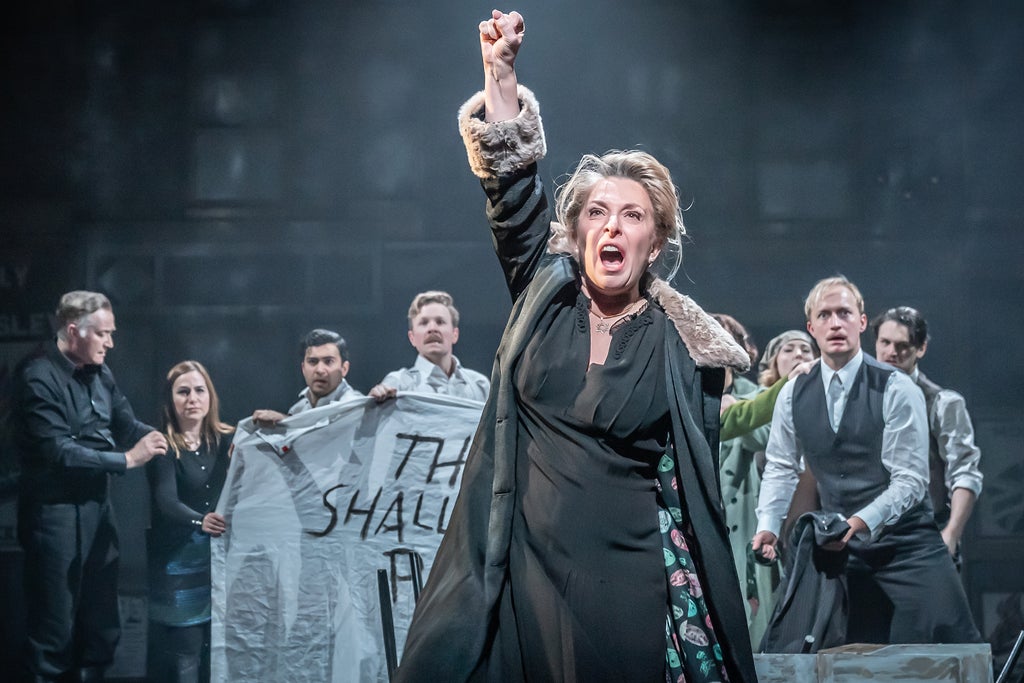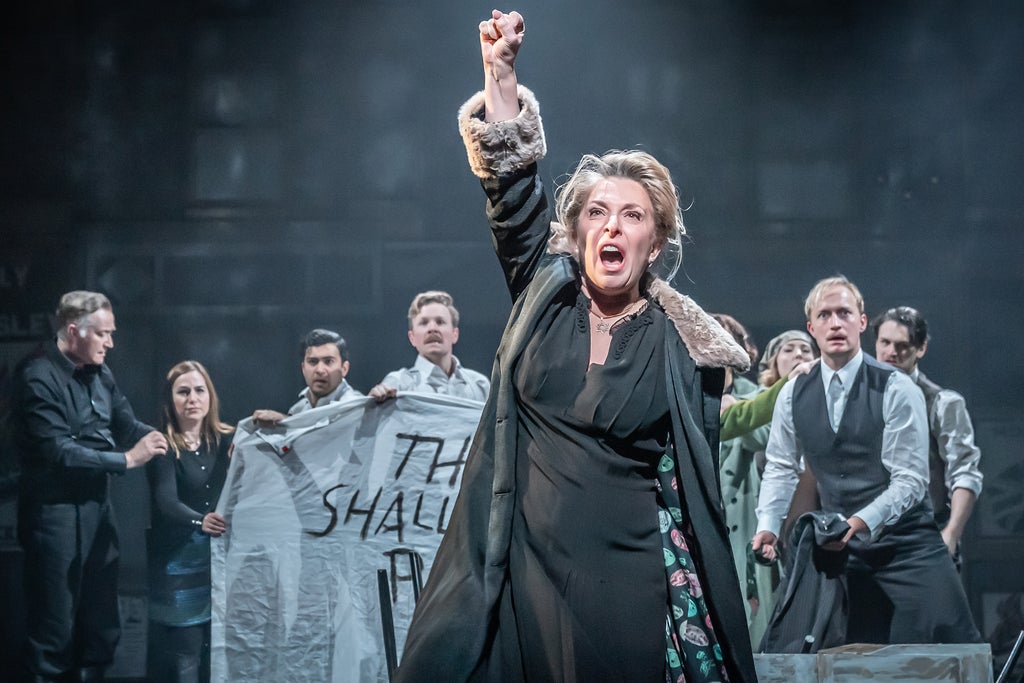Interview: 'I've Always Hated the Play': Tracy-Ann Oberman on Antisemitism, Changing Attitudes and Adapting THE MERCHANT OF VENICE 1936
'It's a constantly developing piece of theatre, so even if people have seen it before, it's going to look and feel very different this time.'
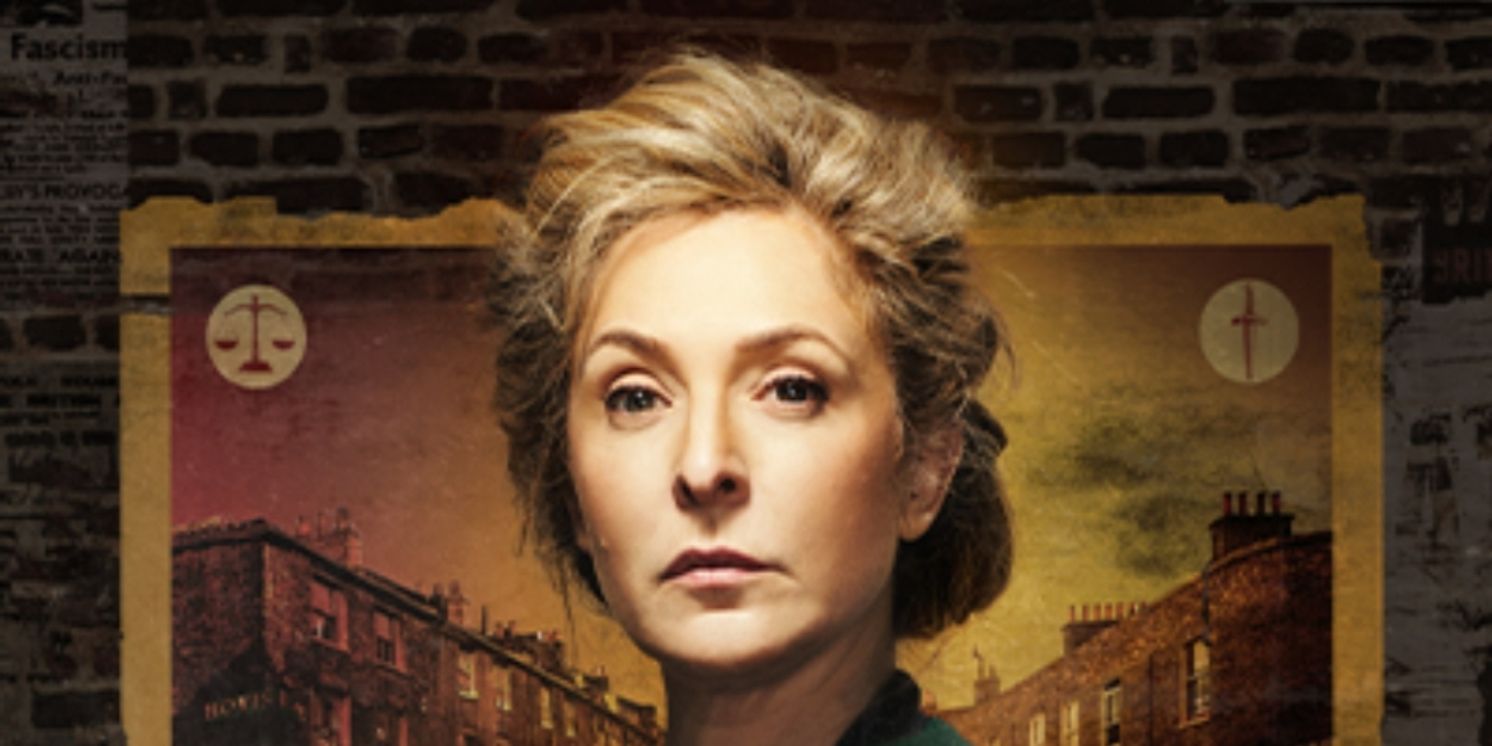
After a successful run at the Criterion Theatre earlier this year, The Merchant of Venice 1936, an adaptation of Shakespeare’s work by Brigid Larmour and Tracy-Ann Oberman, with Oberman starring as a female version of the Jewish moneylender, Shylock. Larmour and Oberman have moved the setting to London in the 1930s, when fascism was on the rise with Oswald Mosley and his Blackshirts, culminating in the Battle of Cable Street on 4 October 1936.
BroadwayWorld spoke with Oberman about returning to the role of Shylock and bringing The Merchant of Venice 1936 back to the West End. We discussed what it was like to breathe new life into Shakespeare’s work, what she hopes audiences take away from the show and what it has been like to see audience reactions to the show as it has developed.
Starting with a general question, how did you first get started in the world of theatre?
I always wanted to be an actress, but my family were very nervous about it because when I was growing up, if you didn't come from a family of actors, it was like saying you wanted to be an astronaut! But I ended up at university doing a drama degree and... I applied for drama school after I finished university and my parents were really nervous! They were like, “You've just done three years at uni!” Then, the day after I left drama school - at this point, I'd been studying for about seven years - I got an audition for the Royal Shakespeare Company and ended up there. So I went straight to the Royal Shakespeare Company for three years and I've never stopped since!
And what is it that drew you to working on Shakespeare in particular?
Well, I don't think it was particularly that! I'd always loved Shakespeare. I remember going to the Royal Shakespeare Company as a student and going to see Troilus and Cressida and thinking it was amazing, really loving it and Stratford. But I was a young actress. I was straight out of drama school - my agent put me up for the Royal Shakespeare Company and that's where I went! It was a great experience to be there for so long. But I've also done stand-up comedy, loads of sketch shows, comedy shows, dramas on television . . . I've had a really broad, ranging career - I also write! So I wouldn't say that it's a particular love of Shakespeare. It was just where I went, and it was an amazing experience. I worked with some amazing people like Cicely Berry and John Barton. The training I got there was fantastic, so it meant that I was never intimidated by Shakespeare after that.
You mentioned the wide range of things that you've been involved in through stage and screen. What is it like performing for each of these different forms of entertainment?
Different forms of storytelling, I always think of it. With theatre, the rehearsals for me are the most exciting bit. You take words off a page, you get a group of people together, you create a piece of work and then you've got a living, breathing entity. The skill that it takes to do theatre, particularly in long runs, is you've got to make that performance fresh every night and feel like you're saying those words for the first time. It takes stamina and imagination, but you also get the excitement of a live theatre. There’s an audience there and it's a bit like the audience is the other member of the cast that isn't allowed in until that first performance. It's very exciting because you never really know what you've made until the audience comes in and tells you.
So for me, the excitement of having a live response every night, particularly in The Merchant of Venice 1936 because it's such a strong response every night, whereas it's a very different technique for film and television. Television is much more of a director's medium because ultimately, you haven't got control of the final cut. But it's a much more internal way of working. Much more internalised - it's a very different technique.
And now you're telling this story with the adaptation of Shakespeare’s The Merchant of Venice, now The Merchant of Venice 1936. Can you tell us a bit about what inspired you to adapt it?
Yes - I've always hated the play! [Laughs] I think it's a very difficult play. Shakespeare wrote it 200 years after every Jew had been kicked out of England very violently, and there weren't even any Jews in England and yet still, the audience had an appetite for evil Jewish villains.
I went to see the all-female version of Julius Caesar at the Donmar [2012] and it really made sense to me. It really worked! I'd always wondered what would happen if you turned Shylock into a single mother as opposed to a single father, and the relationship with her only daughter - that was an opening thing for me. And then around the same time, a lot of people were saying The Merchant of Venice shouldn't be performed anymore because it's difficult and racist and antisemitic.
But I don't think you should take things out of history. I don't think you should just erase things that are uncomfortable - you need to recontextualise them. So I really wanted to recontextualise The Merchant of Venice in a way that shows it for the play that it is. I remember being taught it at school and the idea being that Portia was the heroine, this lovely Christian heroine, Antonio was this kindly merchant and then the evil Jew just wanted to take the power.
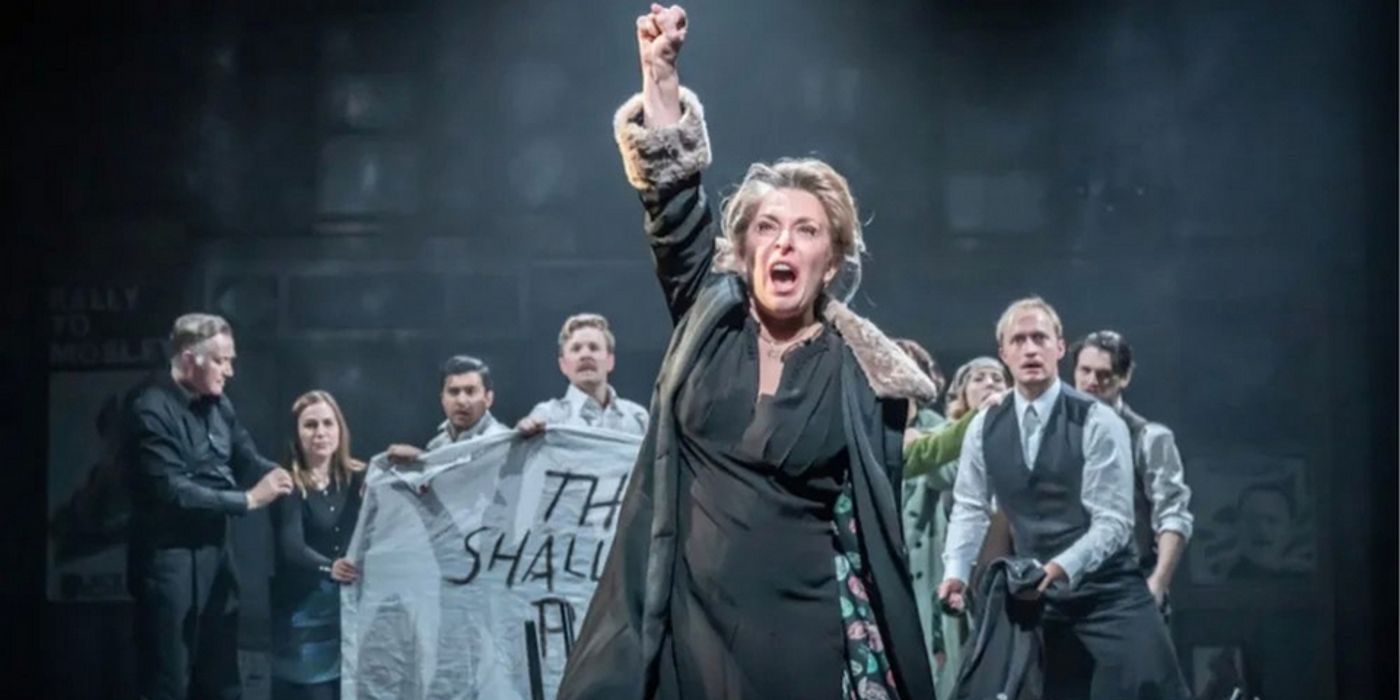
Photo Credit: Marc Brenner
I was raised with three strong matriarchs in my family. My great-grandmother, Annie, escaped the pogroms in Belarus and came over to England. She was nearly raped and her father was nearly beheaded in these anti-Jewish pogroms, and she came over to England. And even though it was antisemitic here, she always called it the Golden Medina. She loved it! And she ultimately ended up a widow in the East End of London, in the tenement slums with my grandma and my two great-uncles. I was brought up with stories of her coming face to face with Oswald Mosley and the British Union of Fascists at the Battle of Cable Street.
I met Brigid Larmour, a director who was running the Watford Palace Theatre, at a theatre award ceremony. I told her about this project and we started working on it together. We did a workshop there - we wanted to see if it worked as an idea. So to have a female Shylock with this daughter changed the play enormously. And then to have the aristocrats, Venetian aristocrats, be turned into these British Union of Fascists aristocrats . . . Our Portia is very much a better-educated Diana Mitford. Our Antonio is Oswald Mosley's greatest fan and the other upper aristocrats are like those aristocrats in the 30s who'd lost money and were holding on to their estates for dear life. It was very easy to blame the Jews for everything - as did Hitler. So that was the brew, and that's what made me want to put it together with a female Shylock.
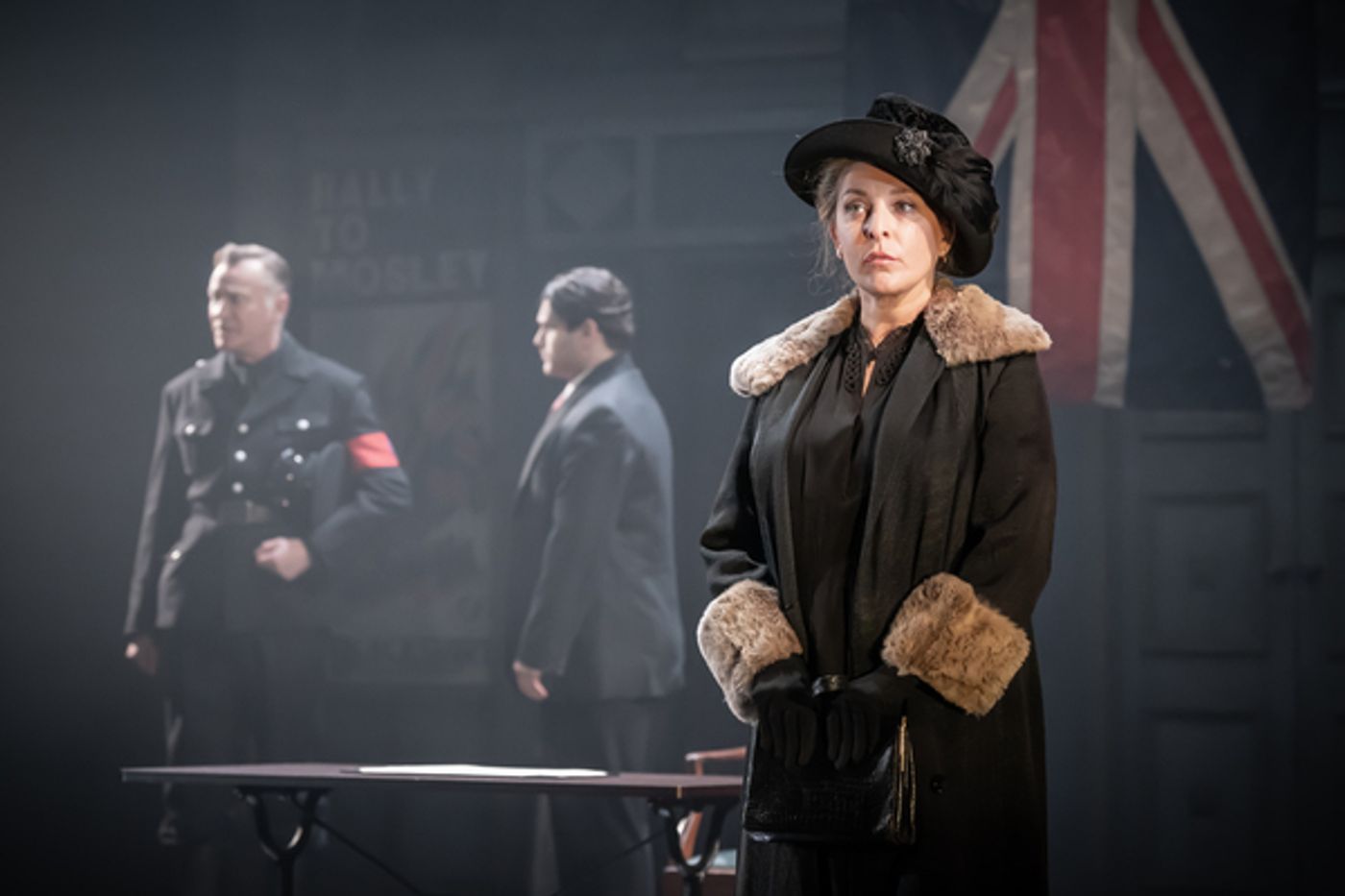
Photo Credit: Marc Brenner
And so what was the creative process like once you decided that you were going to adapt this and found the director to work with?
We did a workshop at the Watford Palace Theatre to see if it worked as an idea with some amazing actors. And it did work! We had a regional theatre tour that was going to be happening in 2020 with Trafalgar Entertainment taking it on - probably to Wilton’s and then into the West End. And then, because of Covid, the whole thing got shelved. I was really sad and thought, “Oh, it's never going to happen now.” ... but we were so lucky because Trafalgar Entertainment - Dame Rosemary Squire, Dan Brodie and Eilene Davidson - kept the faith. And I was very lucky because Erica Whyman and Griselda Yorke knew how passionate I was about the project. They allowed us to do a week's workshop at the RSC - really gave us resources and actors to develop it.
At the end of that, we bought in some other producers and theatres, and they loved it. And then on the back of that, we did it at Watford Palace Theatre and Hull, which were two originating theatres. I thought that would be the end of it. Then it was picked up by the Royal Shakespeare Company, where it was sold out twice. And then it went on a national tour all around the country for thirteen weeks, where it sold out everywhere. We were able to keep working on it and developing it, and then it got fast-tracked into the West End to the Criterion Theatre this February - it sold out there immediately. Now it's coming back with some new cast, which is very exciting, and also some new creatives. So we're working on it all the time. It's a constantly developing piece of theatre, so even if people have seen it before, it's going to look and feel very different this time.
And what has it been like performing the role of Shylock yourself?
I've seen productions where Shylock has been there to be pitied, and I've seen productions where Shylock is a pure villain - I don't think I particularly loved either of them, but I wanted to stay true to what was written in the text. And what was written in the text is a very difficult character. I always think of Shylock as a “she” now - I can't see her as any different! Why doesn't she just take the money in the court case? Why does she insist on this pound of flesh? And so I absolutely understood the character and the world that we've created based on my great-grandmother living in this racist, antisemitic East End of London in the 1930s. I understood her completely. I understood her motivation, and my whole ethos was I didn't want to change who she was on the page. I wanted audiences to understand her, not necessarily to like her.
And something magical has happened by having a female Shylock because it's opened up the play for a lot of people to see that misogyny and racism often go hand in hand. Much of our audience haven't been Jewish. A lot of them have come from Muslim, Sikh, Hindu, working-class communities. Strong, tough, matriarchal mothers who've come over to this country, or come from poverty. They're often the ones that keep the family together. They're very strong and they're not always liked by the upper and middle classes.
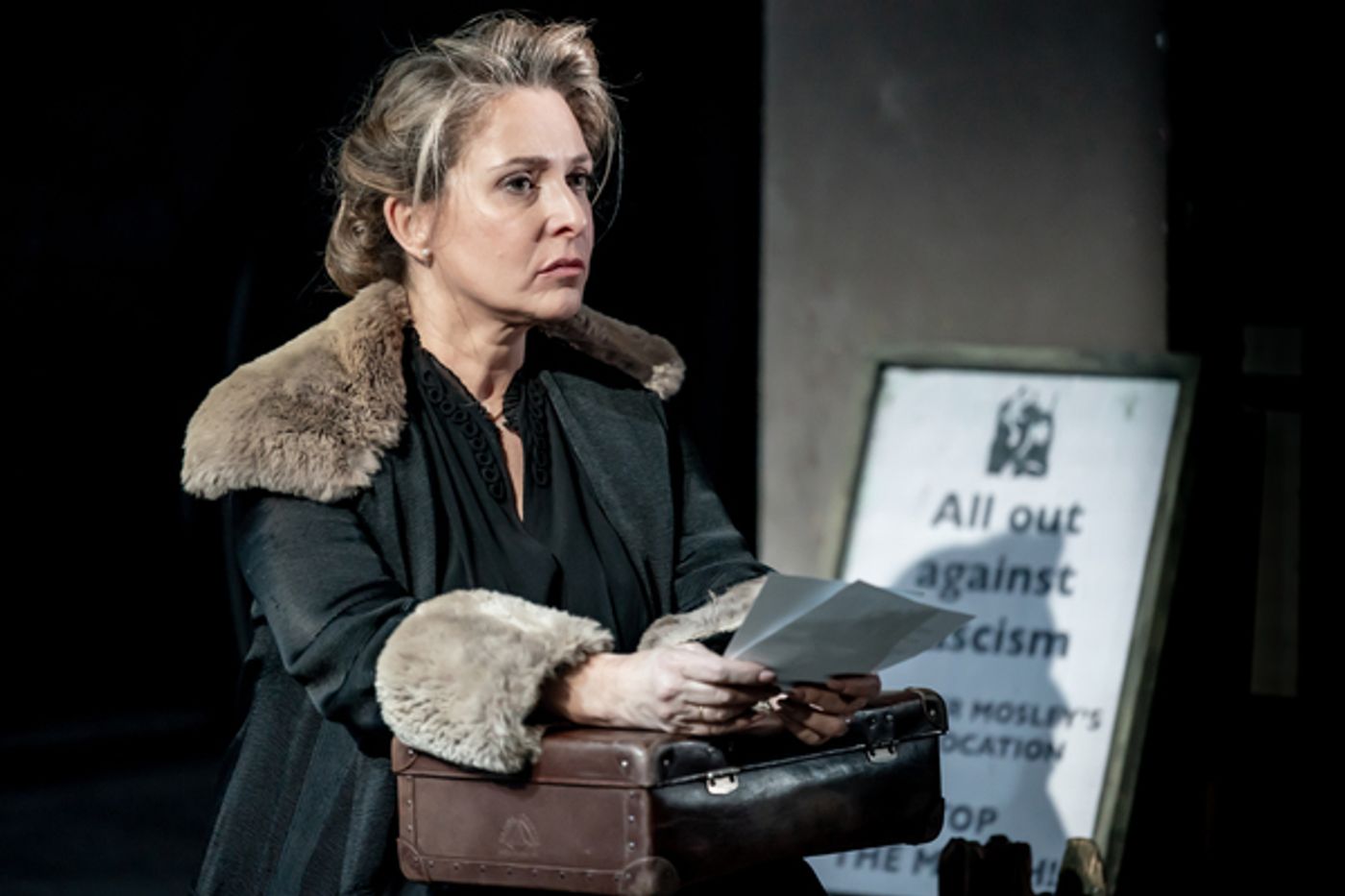
Photo Credit: Marc Brenner
What has it been like to have the audience reactions to this show?
Honestly, I've been working a long time, and I always find this really exciting. I do love it! And even though I do a lot of filming, I've always tried to do a play a year. This has been the project of my life because I've created it. It's based on my family history, and I wanted it to have a legacy. I wanted it to speak to people. I wanted it to change perceptions. I wanted people to understand what anti-Jewish hatred, antisemitism, really looked like. I wanted people to understand what it's like to be an outsider. I wanted people to see this play for the nastiness that's embedded in it. It's about a woman who's an outsider, who has a legal contract in a country that says it's all about the law, who stands up for what she believes is her legal right and is destroyed by church and state.
The letters that I've had from people saying, “I've never admitted to being Jewish. I'm 70 years old. My parents always told me not to talk about it. After seeing your play, I'm going to.” People coming and saying, “I want to be one of those people that stand with minorities now. This has changed my view of how we have to stand together against a greater evil.” I've had people staying behind and wanting to talk saying, “My grandfather or my father was at the Battle of Cable Street. They came down from Liverpool, they came down from Leicester. They wanted to stand with the Jewish community against the fascists.” The response has been incredible, as seen by the sellout shows that we had all over the country. It's been incredibly gratifying.
So I'm very excited that it is being brought back within the year, in a very competitive time to get a West End venue. To come back to the Trafalgar is incredible, and then to take it back on tour feels like such a privilege. We hope it's going to have a life abroad afterwards. We're living in a time of othering. So much hatred and pitting minorities against each other is rising - we have to be very vigilant. And this play seems to talk to all of that but in a very sexy, punchy, short, entertaining way.
Finally, how would you describe The Merchant of Venice 1936 in one word?
Essential.
The Merchant of Venice 1936 runs from 28 December to 25 January 2025 at the Trafalgar Theatre, then tours the UK until 5 April 2025


